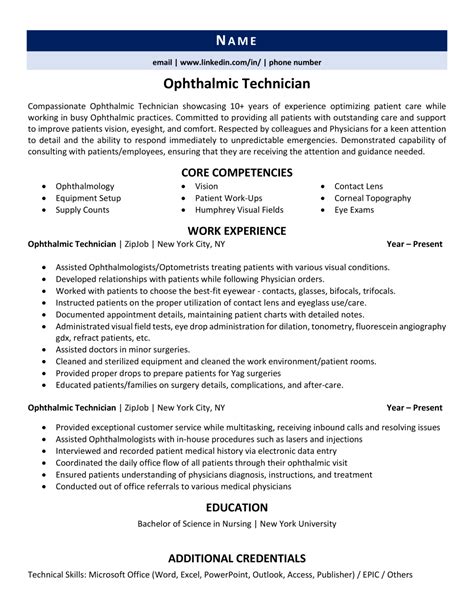The field of ophthalmology is a specialized branch of medicine that deals with the diagnosis, treatment, and prevention of disorders and diseases related to the eye. Ophthalmic technicians, also known as ophthalmology techs, play a vital role in supporting ophthalmologists and optometrists in providing quality patient care. In this article, we will delve into the job description and responsibilities of an ophthalmology tech, exploring their duties, skills, and the impact they have on the healthcare system.
What is an Ophthalmology Tech?

An ophthalmology tech is a medical professional who assists ophthalmologists and optometrists in providing patient care, conducting tests, and performing administrative tasks. They work in hospitals, clinics, private practices, and other healthcare settings, playing a crucial role in the diagnosis and treatment of eye-related disorders.
Key Responsibilities of an Ophthalmology Tech
The primary responsibilities of an ophthalmology tech include:
- Preparing patients for exams and procedures
- Conducting visual acuity tests, including Snellen charts and autorefraction
- Performing ocular motility and binocular vision tests
- Assisting with ophthalmic imaging, such as ultrasound and OCT scans
- Administering topical anesthetics and dilation agents
- Maintaining and calibrating ophthalmic equipment
- Recording patient data and medical history
- Preparing and dispensing medications
- Assisting with minor surgical procedures
Skills and Qualifications Required

To be successful as an ophthalmology tech, individuals should possess:
- Strong communication and interpersonal skills
- Ability to work effectively in a team environment
- Basic knowledge of ophthalmic terminology and anatomy
- Familiarity with ophthalmic equipment and technology
- Attention to detail and organizational skills
- Ability to maintain patient confidentiality and adhere to HIPAA regulations
- High school diploma or equivalent required; associate's degree or certification preferred
Education and Training
Ophthalmology techs typically complete a post-secondary education program in ophthalmic technology, which may include:
- Certificate programs: 1-2 years
- Associate's degree programs: 2 years
- Bachelor's degree programs: 4 years
- Certification programs: 1-2 years
Certification is not mandatory but highly recommended. The Joint Commission on Allied Health Personnel in Ophthalmology (JCAHPO) offers various certification levels, including Certified Ophthalmic Assistant (COA), Certified Ophthalmic Technician (COT), and Certified Ophthalmic Medical Technologist (COMT).
Career Advancement Opportunities

With experience and additional education, ophthalmology techs can advance to:
- Lead or senior tech positions
- Ophthalmic educator or instructor roles
- Clinical research coordinator positions
- Sales or marketing roles in the ophthalmic industry
- Advanced certification levels, such as COMT or Master's degree in ophthalmic technology
Salary and Job Outlook
The median annual salary for ophthalmology techs in the United States is around $45,000, depending on location, experience, and certification level. The job outlook is promising, with the Bureau of Labor Statistics predicting a 13% growth in employment opportunities for medical assistants, including ophthalmology techs, from 2020 to 2030.





Conclusion
Ophthalmology techs play a vital role in the healthcare system, providing essential support to ophthalmologists and optometrists in the diagnosis and treatment of eye-related disorders. With a strong foundation in ophthalmic technology, individuals can pursue a rewarding career in this field, with opportunities for advancement and professional growth. As the demand for eye care services continues to grow, the importance of ophthalmology techs will only continue to increase.
What is the primary responsibility of an ophthalmology tech?
+The primary responsibility of an ophthalmology tech is to assist ophthalmologists and optometrists in providing patient care, conducting tests, and performing administrative tasks.
What skills and qualifications are required to be an ophthalmology tech?
+Ophthalmology techs should possess strong communication and interpersonal skills, basic knowledge of ophthalmic terminology and anatomy, and familiarity with ophthalmic equipment and technology.
What education and training are required to become an ophthalmology tech?
+Ophthalmology techs typically complete a post-secondary education program in ophthalmic technology, which may include certificate, associate's degree, or bachelor's degree programs.
